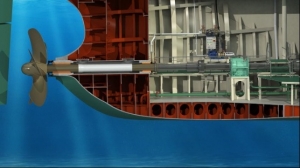


(Posted on 22/12/20)
Thordon Bearings has added to the growing concern over proposed changes to Vessel Incidental Discharge National Standards of Performance (VIDA) requirements, citing far reaching environmental consequences if clauses in the existing document are removed.
In a statement submitted to the United States Environmental Protection Agency on 20 November 2020, the Canada-based bearings and seals pioneer “strongly questions the removal of some text” in the proposed amendments, stating that such omissions will mean existing zero pollution solutions will be overlooked.
In the current Vessel General Permit (VGP 2013), the US EPA recommends that all newbuild vessel operators endeavor to use seawater-based systems for their stern tube lubrication to prevent the discharge of oil from these interfaces to the marine environment. But in the revised VIDA draft there is no mention of seawater as an Environmentally Acceptable Lubricant (EAL).
“It mentions composite bearings but does not state that the composite bearings must be lubricated by seawater to eliminate all risk of pollution,” said Craig Carter, Director of Marketing and Customer Service, Thordon Bearings.
Calling for a 60-day extension to the period in which stakeholders can comment on the proposals, Thordon states in the letter: “The omission of this text from the VIDA proposal minimizes the fact that a current in-use and proven zero pollution solution that has no impact on our seas and oceans is likely to be overlooked by vessel operators if it does not appear in the new VIDA.
“For vessel operators using seawater as a stern tube lubricant, there is absolutely zero impact on the ocean and sea environment, as there is no oil or synthetic EAL used. We firmly believe that the recommendation from the U.S. EPA stated in the VGP 2013, to use the only lubricant that has no impact on the environment and is currently in use in thousands of vessels, is an incredibly powerful statement to eliminate stern tube oil pollution from ships navigating US waters.
“Why would the EPA want to remove such a statement from the 2013 VGP that encourages new ships to be built using seawater lubrication, whereby the impact can eliminate this ship source of oil pollution forever? This omission from the Oil Management section would be deemed as going backward, rather than forward.”
The glaring omission is not the only issue with the proposed amendments. A major concern is the confusion surrounding air-type shaft seals.
On page 56 of the proposed draft, it states “during normal operation, small quantities of lubricant oil in these interfaces are released into surrounding waters.” But three pages later: “To the extent that these seals do not allow the lubricant to be released under normal circumstances they are not considered to be oil-to-sea interfaces.”
“These statements do not take into account seal failure resulting from rope or fishing lines becoming entangled around the propeller shaft. The aft seal damage can be severe, creating an oil-to-sea interface enabling synthetic lubricant/oil to flow freely out into the ocean. The confusion could also result in ship operators using mineral oil in an air seal, which is worse than an EAL discharge.”
Thordon also raises questions about the harmful impact that synthetic/vegetable EALs may have on aquatic life, suggesting that more research needs to be done on their environmental impact before their use can be approved as an EAL.
At the time of writing, www.regulations.gov, the US government website used for public commentary on new and existing regulations, had received 179 comments on the proposed VIDA amendments.
Bruks Siwertell Group has announced a leadership transition as Peter Jonsson steps down as CEO after... Read more
ClassNK has issued an approval in principle (AiP) for a Rigid Windsail Type Wind-Assisted Propulsion... Read more
Elcome International’s new high-speed internet service, WELCOME, is revolutionising the way ship... Read more
Kaiko Systems, a leader in AI-driven frontline intelligence for the maritime industry, today announced... Read more
Marcegaglia’s latest acquisition, the LHM 600, marks a significant milestone as the 2,000th mobile... Read more
The Isle of Man Ship Registry (IOMSR) is playing a key role in the development of a high-tech sail aimed... Read more
AtoB@C Shipping, subsidiary of ESL Shipping, has taken delivery of Terramar in Goa, India on 14 March... Read more
As a new strategy period commences, VIKING Life-Saving Equipment A/S has achieved strong financial results... Read more
Baltic Exchange has introduced a series of green fuel options to its FuelEU voyage and compliance cost... Read more
Veson Nautical, a global leader in maritime data and freight management solutions, and Cargill have... Read more